What is a Friendly Loan? Daily Law Tips (Tip 776) by Onyekachi Umah, Esq., LL.M, ACIArb(UK)
Introduction:
There are several seasons in life and so are there several seasons in the finance of men. When a person is in need, he/she will most probably request for support from his/her family, friends and associates. Often the financial support from family and friends could be a gift (there are given freely and never to be repaid). However, in some cases, the financial support from family and friends are not gift but loan/debt (they are freely given but to be repaid). Repaying for loan/debt from family and friends could be with or without interest. And, a loan from family and friend can be a friendly loan, not because it is from friends but because of its nature. This leads to the need for a definition and nature of a friendly loan under the Nigerian laws. When will the Nigerian courts declare a debt to be a friendly loan?
Nature of Friendly Loans:
There is really no fixed term as a “friendly loan” rather, it is the circumstances of a loan that will determine whether the loan is a friendly one or not. The Court of Appeal in Nigeria has had an opportunity to explain the nature of a friendly loan in its judgment in the case of; CHAMPION BREWERIES PLC v. SPECIALTY LINK LTD & ANOR (2014) LPELR-23621(CA). In that case, Justice Mbaba, held that;
“A friendly loan, as the name implies, is a loan from a friend to a friend, which makes no room for usury or interest or penalty. It connotes a lifeline thrown by a friend to a friend, to bail him out of trouble and does not contemplate profiting from the gesture, financially. I looked at the Black Law Dictionary and other English dictionaries for the meaning of “friendly loan” I did not see in the ones I consulted. But I saw the meaning of the adjective “friendly” to mean – “kind; behaving as a friend, relating to, or typical of a friend, being a colleague, helper partner etc” In the sense of that word a “friendly loan” therefore does not admit of interest, or any thing that detracts from kindness, friendship, help and partnership, which charging of interest or usury is likely to cause. See First Bank of Nigeria v. I.A.S. Cargo Airlines Nig. Ltd (2011) LPELR- 9827(CA) where Salawa, JCA held: “However, where the Plaintiff happens to be a
private person, or the loan is stated to be a “friendly loan” and no interest charge is fixed at the time of entering into the loan agreement, the Court is precluded from awarding interest in such circumstances.” See UBN v. SAX Nig Ltd (1994) 8 NWLR (Pt. 361) 150; UBN v. OZIGI (1994) 3 NWLR (Pt. 363) 385; Hausa v. First Bank of Nigeria Plc CA/J/295/981 unreported decision of this Court delivered on 12/4/2000; UBN v. SALAMI (1998) 3 NWLR (Pt. 538) See also IDAKULA v. RICHARD (2001) FWLR (Pt. 693) 111 where AKPABIO, J.C.A. (of blessed memory) said: “… The Court will readily award a pre-judgment interest, where the plaintiff is a Commercial Bank, and the rate of interest fixed at the inception of the loan or over draft transaction; whereas, if the plaintiff was a private person; or the loan stated to be a “friendly loan” and nothing said about interest charges at the time of entering into the loan agreement, the Court will not award interest in such circumstances.”
The Supreme Court of Nigeria is not left out in this issue. The apex court has in the case of DIAMOND BANK LTD v. PARTNERSHIP INVESTMENT CO LTD & ANOR (2009) LPELR-939(SC), held that; “…the general rule at Common Law, is that interest is not payable on a debt or loan in the absence of express agreement or some course of dealing or custom to that effect. See London Chattam and Dover Railway v. South Eastern Railway (1893) A.C 249. Thus, interest will however, be payable where there is an express agreement to that effect and such an agreement, may be inferred from a course of dealing between the parties. See Re-Duncan and Co, (1905) 1 Ch. 307 or where an obligation to pay interest arises from the common or usage of a particular trade or business and I add like in banking.” Per OGBUAGU ,J.S.C ( Pp. 29-30, paras. D-A ).
Also, in the case of ISHOLA v. SOCIETE GENERALE BANK (NIG) LTD (1997) LPELR-1547(SC), the Supreme Court, held that “But where there is no express agreement as to the rate of interest payable, it seems that the bank is entitled to charge interest rate on the basis that there is now an established custom to that effect or that the customer has impliedly consented where, without protest, he allows his account to be debited with such interest. See Barclays Bank of Nigeria Ltd v. Alhaji Maiwada Abubakar (1977) 10 SC 13.” Per IGUH ,J.S.C ( P. 53, paras. B-c )
Conclusion:
From the above judgments of the courts, it is safe to conclude that a friendly loan is a loan that was given out of kindness and without any intention to receive interest from or on the loan. The courts in Nigeria will often not allow an interest to be received on a loan that was given out of kindness by a private person without any agreement as to payment of interest on the loan (it is a friendly loan).
However, where a loan is given by a bank or a corporate body in the business of moneylending or with the custom of collecting interest on loans, even where there is no agreement as to interest, the courts will most probably believe that it was the intention of parties that interest should be paid on the loan. For example, having in mind the nature of the business of banks and moneylenders, one cannot convince a court of law that it received a friendly loan from a commercial bank, unless there is a signed agreement or proof that the loan is a friendly one.
My authorities, are:
- The judgment of the Supreme Court of Nigeria in the case of DIAMOND BANK LTD v. PARTNERSHIP INVESTMENT CO LTD & ANOR (2009) LPELR-939(SC)
- The judgment of the Supreme Court of Nigeria in the case of ISHOLA v. SOCIETE GENERALE BANK (NIG) LTD (1997) LPELR-1547(SC)
- The judgment of the Court of Appeal in the case of HAMPION BREWERIES PLC v. SPECIALTY LINK LTD & ANOR (2014) LPELR-23621(CA)
- Onyekachi Umah, “No Bank In Nigeria Can Unilaterally Change /Vary Interest Rate In Its Agreement With A Customer” (LearnNigerianLaws.com, 23 August 2018) <https://sabilaw.org/daily-law-tips-by-onyekachi-umah-esq-tip-168-no-bank-in-nigeria-can-unilaterally-change-vary-interest-rate-in-its-agreement-with-a-customer/> accessed 15 April 2021
- Onyekachi Umah, “Duty of Care Owed By Banks in Nigeria.” (LearnNigrianLaws.com, 1 April 2021) <https://sabilaw.org/duty-of-care-owed-by-banks-in-nigeria/> accessed 15 April 2021
- Onyekachi Umah, “It Is An Offence To Sell A Vehicle Purchased With Unrepaid Bank Loan” (LearnNigerianLaws.com, 2 October 2018) <https://sabilaw.org/daily-law-tips-by-onyekachi-umah-esq-tip-196-it-is-an-offence-to-sell-a-vehicle-purchased-with-unrepaid-bank-loan/> accessed 15 April 2021
- Onyekachi Umah, “Creditors, Debtors And The Covid-19 Lockdown?” (LearnNigerianLaws.com, 21 April 2020) <https://sabilaw.org/creditors-debtors-and-the-covid-19-lockdown-daily-law-tips-tip-552-by-onyekachi-umah-esq-llm-aciarbuk/> accessed 15 April 2021
- Onyekachi Umah, “The Supreme Court Has Warned Efcc And Police Against Recovering Debts And Investigating Disputes From Civil Transactions” (LearnNigerianLaws.com, 26 October 2019) <https://sabilaw.org/the-supreme-court-has-warned-efcc-and-police-against-recovering-debts-and-investigating-disputes-from-civil-transactions-daily-law-tips-tip-444-by-onyekachi-umah-esq-llm-aciarb-uk/> accessed 15 April 2021
- Onyekachi Umah, “When, Why And How Can A Guarantor/Surety Be Held Liable For Debt Guaranteed” (LearnNigerianLaws.com, 25 July 2019) <https://sabilaw.org/when-why-and-how-can-a-guarantor-surety-be-held-liable-for-debt-guaranteed-daily-law-tips-tip-380-by-onyekachi-umah-esq-llm-aciarb-uk/> accessed 15 April 2021
- Onyekachi Umah, “EFCC Cannot Recover Debts” (LearnNigerianLaws.com, 25 July 2018) <https://sabilaw.org/daily-law-tips-by-onyekachi-umah-esq-tip-149-efcc-cannot-recover-debts/> accessed 15 April 2021
- Onyekachi Umah, “Conditions for Assignment of Burden or Benefit of Debt” (LearnNigerianLaws.com, 30 March 2021) <https://sabilaw.org/conditions-for-assignment-of-burden-or-benefit-of-debt/> accessed 15 April 2021
- Onyekachi Umah, “Owing Debts And Refusing To Pay Is Not An Offence In Nigeria” (LearnNigerianLaws.com, 14 December 2019) <https://sabilaw.org/owing-debts-and-refusing-to-pay-is-not-an-offence-in-nigeria-daily-law-tips-tip-478-by-onyekachi-umah-esq-llm-aciarb-uk/> accessed 15 April 2021
- Onyekachi Umah, “You Cannot Be Arrested For Breach Of Contract/Refusal To Pay Debt” (LearnNigerianLaws.com, 15 October 2018) <https://sabilaw.org/daily-law-tips-by-onyekachi-umah-esq-tip-205-you-cannot-be-arrested-for-breach-of-contract-refusal-to-pay-debt/> accessed 15 April 2021
- Onyekachi Umah, “It Is An Offence For Hospitals/Creditors To Detain Patients/Debtors For Debts” (LearnNigerianLaws.com, 26 July 2018) <https://sabilaw.org/daily-law-tips-by-onyekachi-umah-esq-tip-150-it-is-an-offence-for-hospitals-creditors-to-detain-patients-debtors-for-debts/> accessed 15 April 2021
- Onyekachi Umah, “It Is Not a Crime to Be a Debtor In Nigeria” (LearnNigerianLaws.com, 20 June 2018) <https://sabilaw.org/daily-law-tips-by-onyekachi-umah-esq-tip-124-it-is-not-a-crime-to-be-a-debtor-in-nigeria/> accessed 15 April 2021
- Onyekachi Umah, “Nigerian Police Cannot Be Used For or Be Part for Debt Recovery” (LearnNigerianLaws.com, 28 May 2018) <https://sabilaw.org/daily-law-tips-by-onyekachi-umah-esq-tip-110-nigerian-police-cannot-be-used-for-or-be-part-for-debt-recovery/> accessed 15 April 2021
- Onyekachi Umah, “Tips On Recovery of Debt’ (LearnNigerianLaws.com, 10 March 2016) <https://sabilaw.org/tips-on-recovery-of-debt/> accessed 15 April 2021
- Onyekachi Umah, “How to Recover Property Wrongly Seized by Court” (LearnNigerianLaws.com, 9 March 2021) <https://sabilaw.org/how-to-recover-property-wrongly-seized-by-court/> accessed 15 April 2021
- Onyekachi Umah, “Does Police Have Powers To Settle Civil Disputes In Nigeria?” (LearnNigerianLaws.com, 13 May 2020) <Does Police Have Powers To Settle Civil Disputes In Nigeria?> accessed 15 April 2021
- Onyekachi Umah, “A Guarantor/ Surety And A Witness Are Not Same” (LearnNigeriansLaws.com, 12 May 2020) <https://sabilaw.org/a-guarantor-surety-and-a-witness-are-not-same-daily-law-tips-tip-567-by-onyekachi-umah-esq-llm-aciarbuk/> accessed 15 April 2021
- Onyekachi Umah, “Minimum Period For Defence Of Undefended List Case In Abuja” (LearnNigerianLaws.com, 25 February 2020) <https://sabilaw.org/minimum-period-for-defence-of-undefended-list-case-in-abuja-daily-law-tips-tip-512-by-onyekachi-umah-esq-llm-aciarbuk/> accessed 28 March 2021
- Onyekachi Umah, “Bounced Or Dud Cheque And Its Legal Consequence In Nigeria.” (LearnNigerianLaws.com, 5 March 2016) <https://sabilaw.org/bounced-or-dud-cheque-and-its-legal-consequence/> accessed 15 April 2021
- Pic credit; Dreamstime.Com
Sabi Law Projects:
#SabiLaw
#DailyLawTips
#SabiBusinessLaw
#SabiElectionLaws
#SabiHumanRights
#SabiLawOnTheBeatFm
#SabiLawLectureSeries
#CriminalJusticeMonday
#SabiLawVideoChallenge
Speak with the writer, ask questions or make inquiries on this topic or any other via onyekachi.umah@gmail.com, info@LearnNigerianLaws.com or +2348037665878 (whatsapp). To receive free Daily Law Tips, join our free WhatsApp group via https://chat.whatsapp.com/L7h4f1exItZ38FeuhXG4WN or Telegram group, via the below link: https://t.me/LearnNigerianLaws
To keep up to date on all free legal awareness projects of Sabi Law Foundation, follow us via
Facebook Page:@LearnNigerianLaws,
Instagram:@LearnNigerianLaws,
Twitter: @LearnNigeriaLaw,
YouTube: Learn Nigerian Laws,
WhatsApp Groups via (https://chat.whatsapp.com/L7h4f1exItZ38FeuhXG4WN),
Telegram Group: (https://t.me/LearnNigerianLaws),
Facebook group: (https://www.facebook.com/groups/129824937650907/?ref=share)
or visit our website: (www.LearnNigerianLaws.com)
Please share this publication for free till it gets to those that need it most. Save a Nigerian today! NOTE: Sharing, modifying or publishing this publication without giving credit to the author or Sabi Law Foundation is a criminal breach of copyright and will be prosecuted. This publication is the writer’s view not a legal advice and does not create any form of relationship. You may reach the writer for more information.
This publication is powered by www.LearnNigerianLaws.com {A Free Law Awareness Program of Sabi Law Foundation, supported by the law firm of Bezaleel Chambers International (BCI).} Sabi Law Foundation is a Not-For-Profit and Non-Governmental Legal Awareness Organization based in Nigeria. For sponsorship and partnership, contact: sponsorship@learnnigerianlaws.com, sabilaw.ng@gmail.com or +234 903 913 1200.


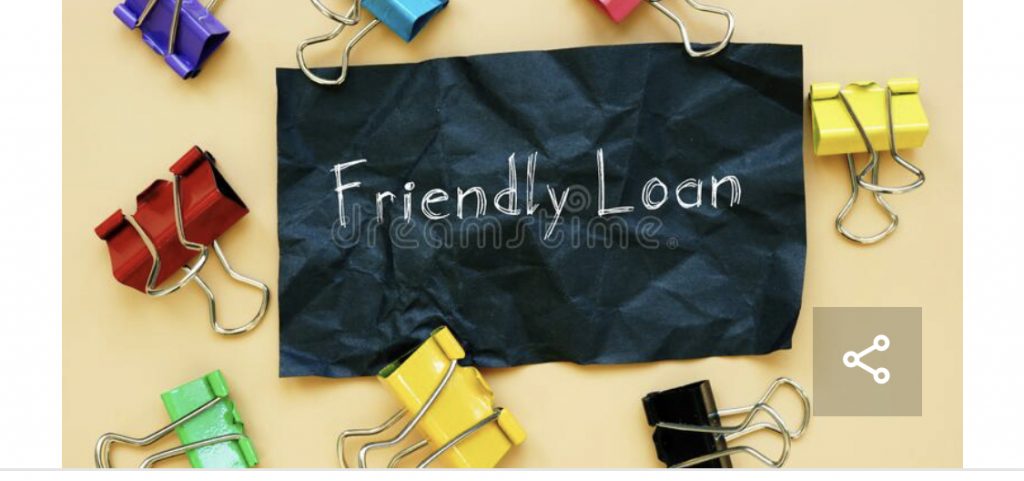
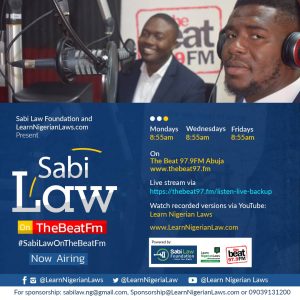
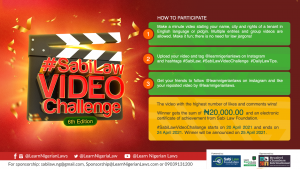
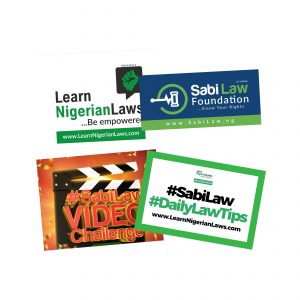
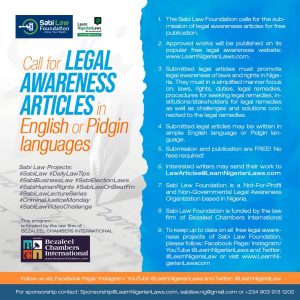


















































One Response